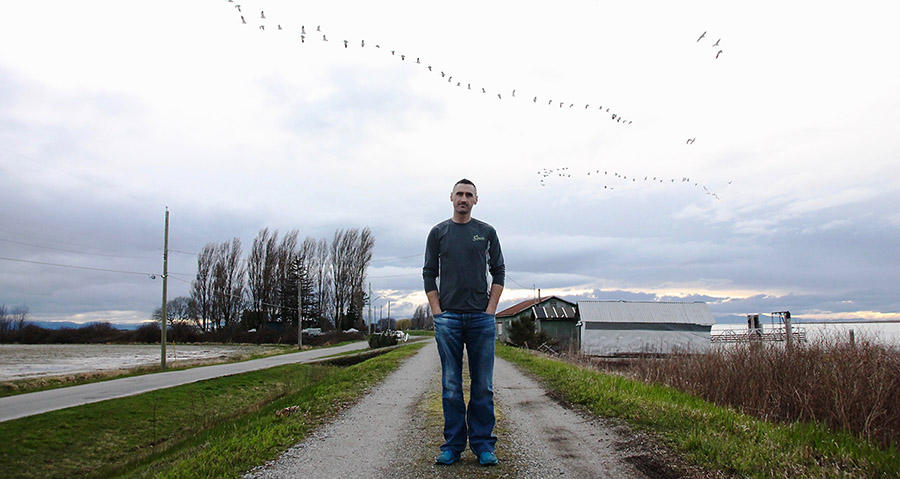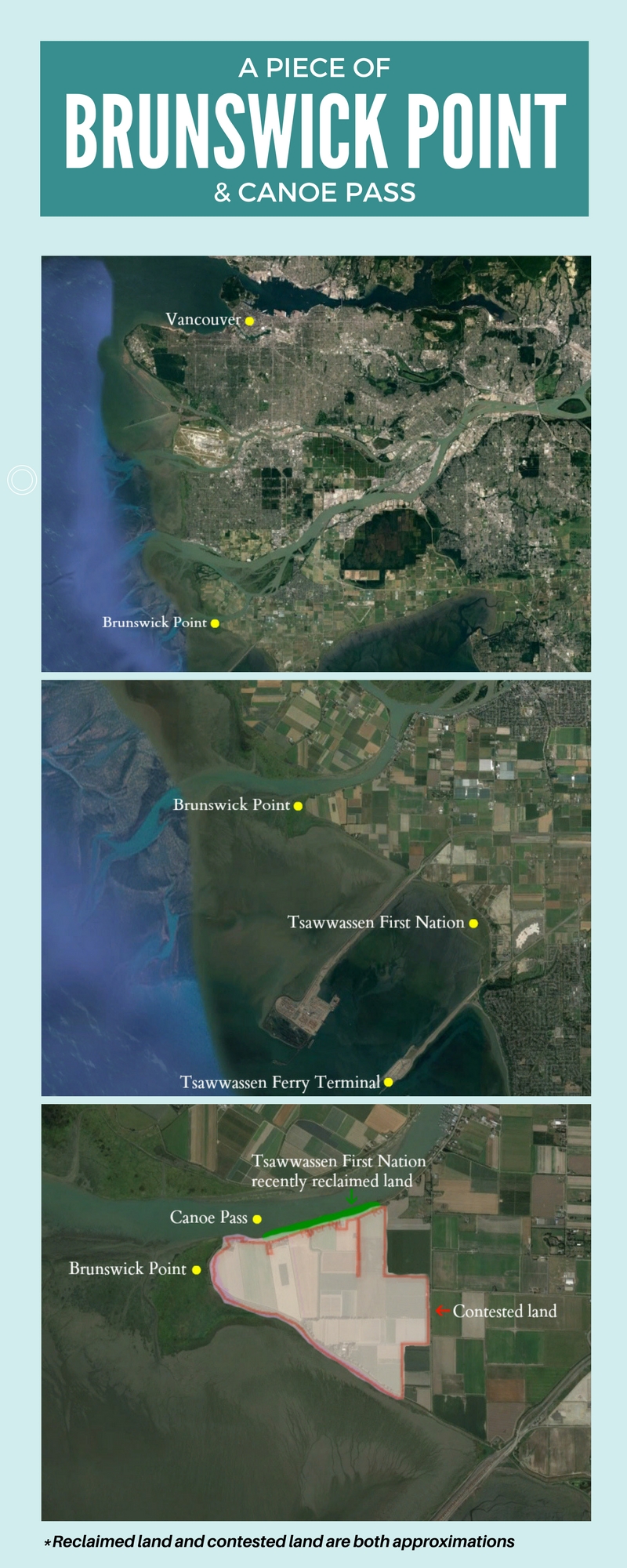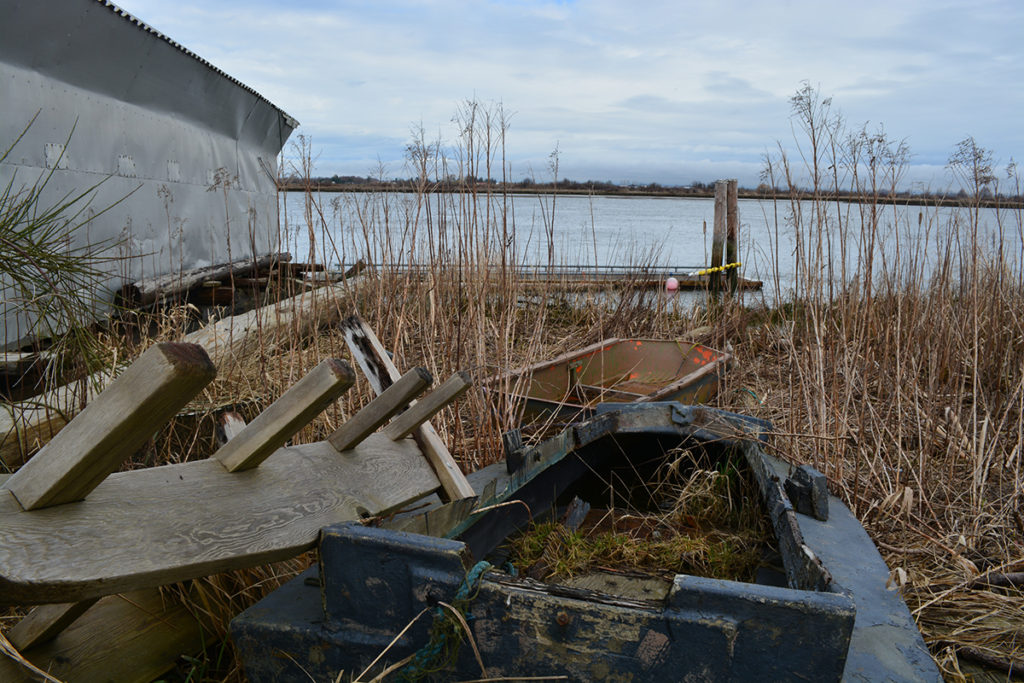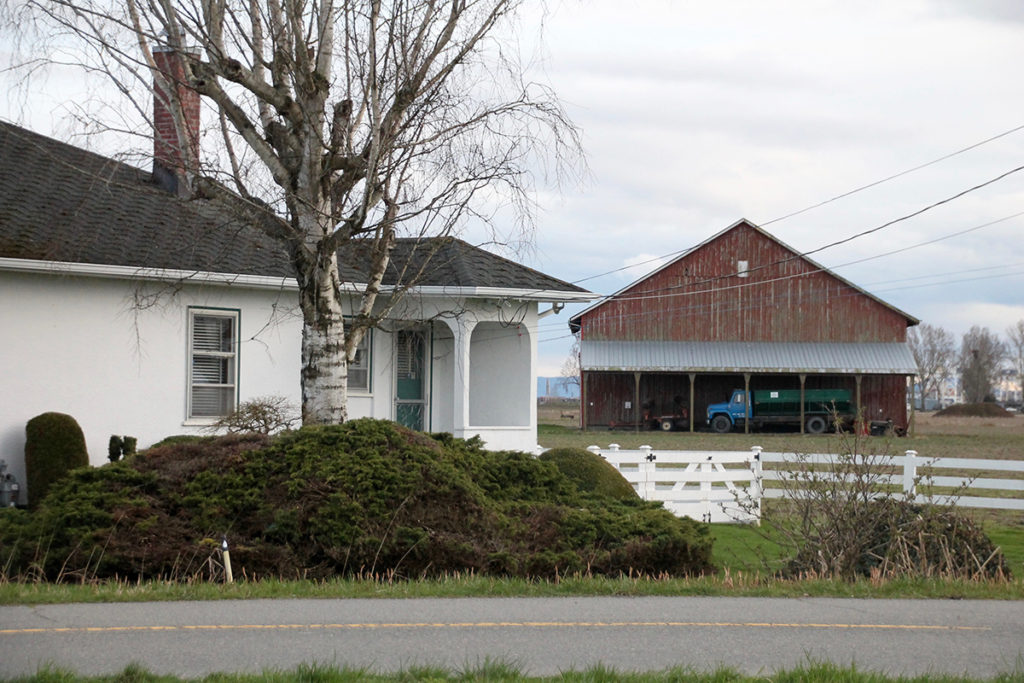
By Alex Migdal and Haley Lewis
Fisherman Steve Stark peers out at the Fraser River on a cloudy afternoon. The water stretches into the horizon, undisturbed by boats and swimmers.
Stark remembers when 20 boats would regularly fish on the river. “Now you’ll get one boat possibly fishing all year here and that’s it,” he says. “It shows a real dismal environment.”
Moss sprouts through the shingles of a nearby smoke salmon shack. Rotting wood planks lay in a twisted pile. Signs caution visitors not to enter.
The Tsawwassen First Nation has a brighter vision for this waterfront land. But the half hectare it recently bought from the province is only a sliver of the 278 hectares in Brunswick Point that it hopes to reclaim.
Infographic: A piece of Brunswick Point and Canoe Pass

The site is caught in two lawsuits that have wound through the courts for years and cast doubt over Tsawwassen’s right to buy the land, pitting the first nation against local farmers and another band.
A Modest Start
The area is sparse, but it’s an exciting first step for Tsawwassen.
The reclaimed half hectare is wedged in the northern tip of Brunswick Point, minutes away from the nation. Canoe Pass borders the site to the north and farmlands neighbour it to the west, south and east.
Tsawwassen has torn out the old docks on the site and is installing new ones this spring. It’s a small fix with big implications, reopening access to the Fraser River that the community has lacked for decades.

“Without salmon and what the Fraser is able to supply for us, I’m not sure we would have been able to settle here and be successful as a First Nation,” Stark says.
Tsawwassen fishermen will now be free to moor on their land rather than launch from far-flung docks in Ladner and Steveston. They’ll also have direct access to the nation when unloading their boats.
The community will be able to hold its yearly fish ceremony on site. The ceremony, which marks the first salmon catch of the season, allows Tsawwassen to return the salmon to the river and honour its sacrifice.
In recent years, the ceremony has been done on boats, but the practice historically has been for members to walk along the water’s edge.
“It’s important for us to do that as close to that place where we actually catch the salmon,” says Andrew Bak, Tsawwassen’s territory management officer.
Tsawwassen leaders are eyeing a new space for the nation’s natural resources department and an interpretive centre. Community meetings around those plans are set for later this year.
For now, members agree that Tsawwassen is regaining a cultural foothold to the Fraser River.
“It’s an important reassertion of our rights and title,” former Tsawwassen chief Kim Baird says. “Our DNA comes from this region and it goes back into this region — and it has for thousands of years.”
Land Disputes
Baird was behind Tsawwassen’s landmark urban treaty in 2009, the first of its kind in B.C.
But that treaty was littered with concessions, namely Tsawwassen giving up claims to some lands for the first right to buy others, including Brunswick Point.
“It was like asking what part of your hand did you want to keep?” Baird says. “It was a really, really tough discussion.”
Talks were further muddled when a group of four farmer families launched a lawsuit in 2006, also claiming first rights to buy the Brunswick Point Lands.
The farmers have lived for decades in the area on a stretch of road facing the river.

In 1968, the province expropriated the land for industrial development. But the project never happened and the farmers argue they should have the first right to buy.
Tsawwassen maintains that it negotiated that right with the province during their treaty settlement. The province is now siding with Tsawwassen in the B.C. Supreme Court case.
The legal battle intensified in 2014, when the Hwlitsum First Nation filed an Aboriginal title claim over part of the Brunswick Point Lands, plus an injunction that barred Tsawwassen from buying the site.
The Hwlitsum aren’t recognized by the Federal Indian Act and have faced questions about their legitimacy.
The band has lived in Brunswick Point for decades and have regularly fished in Canoe Pass. But their riverside property was mowed down years ago, says Hwlitsum chief Lindsay Wilson.
“It’s where my grandparents used to live,” he recalls. “My friends and I, when we were kids, we’d go out there shooting BB guns and hunting the fields.”
“It’s a sacred land,” he adds. “The connection is real and true in the hearts of all of us.”
Reasserting Rights
There’s no easy answer over land ownership when the competing claims are based on “post-colonial regimes,” former chief Baird says.
“Litigation doesn’t match Coast Salish traditions and values. We’re trying to establish ownership, which is a foreign concept.”
As it repurposes the waterfront site, Tsawwassen is starting to honour the land it says has sustained its fishing people for centuries.
Clifford Gurniak is carving one of four commissioned house posts that will mark each corner of the nation’s treaty lands. His post will be erected at Brunswick Point to commemorate the new dock.
The house post depicts an owl and frog, animals common to the area. Gurniak hopes the post will face the river so that he can see it while fishing.
“I’ve always felt that that part of the river belonged to Tsawwassen,” he says. “It’s my home and where I grew up. I love it here.”
Haley Lewis is a multimedia journalist, social justice seeker and Mohawk of the Bay of Quinte. Follow her on Twitter @haleylewis_
Alex Migdal is a Vancouver-based journalist with an interest in education and social justice issues. Favourite his tweets at @alexem

